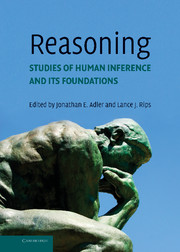Book contents
- Frontmatter
- Contents
- Preface
- List of Contributors
- Introduction: Philosophical Foundations
- PART I FOUNDATIONS OF REASONING
- PART II MODES OF REASONING
- Section 3 Deductive Reasoning
- Section 4 Induction
- Section 5 Dual and Integrative Approaches
- Section 6 Abduction and Belief Change
- Section 7 Causal and Counterfactual Reasoning
- 29 Causal Thinking
- 30 Causation
- 31 Propensities and Counterfactuals: The Loser That Almost Won
- Section 8 Argumentation
- PART II INTERACTIONS OF REASONING IN HUMAN THOUGHT
- Index
30 - Causation
Published online by Cambridge University Press: 05 June 2012
- Frontmatter
- Contents
- Preface
- List of Contributors
- Introduction: Philosophical Foundations
- PART I FOUNDATIONS OF REASONING
- PART II MODES OF REASONING
- Section 3 Deductive Reasoning
- Section 4 Induction
- Section 5 Dual and Integrative Approaches
- Section 6 Abduction and Belief Change
- Section 7 Causal and Counterfactual Reasoning
- 29 Causal Thinking
- 30 Causation
- 31 Propensities and Counterfactuals: The Loser That Almost Won
- Section 8 Argumentation
- PART II INTERACTIONS OF REASONING IN HUMAN THOUGHT
- Index
Summary
Hume defined causation twice over. He wrote “we may define a cause to be an object followed by another, and where all the objects, similar to the first, are followed by objects similar to the second. Or, in other words, where, if the first object had not been, the second never had existed.”
Descendants of Hume's first definition still dominate the philosophy of causation: a causal succession is supposed to be a succession that instantiates a regularity. To be sure, there have been improvements. Nowadays we try to distinguish the regularities that count – the “causal laws” – from mere accidental regularities of succession. We subsume causes and effects under regularities by means of descriptions they satisfy, not by overall similarity. And we allow a cause to be only one indispensable part, not the whole, of the total situation that is followed by the effect in accordance with a law. In present-day regularity analyses, a cause is defined (roughly) as any member of any minimal set of actual conditions that are jointly sufficient, given the laws, for the existence of the effect.
More precisely, let C be the proposition that c exists (or occurs) and let E be the proposition that e exists. Then c causes e, according to a typical regularity analysis, iff (1) C and E are true; and (2) for some nonempty set ℒ of true law-propositions and some set ℱ of true propositions of particular fact, ℒ and ℱ jointly imply C ⊃ E, although ℒ and ℱ jointly do not imply E and ℱ alone does not imply C ⊃ E.
- Type
- Chapter
- Information
- ReasoningStudies of Human Inference and its Foundations, pp. 632 - 638Publisher: Cambridge University PressPrint publication year: 2008



